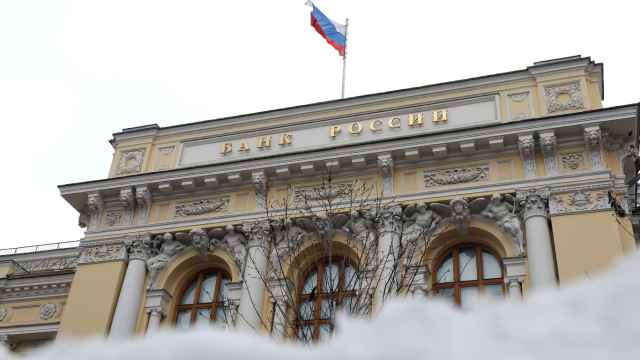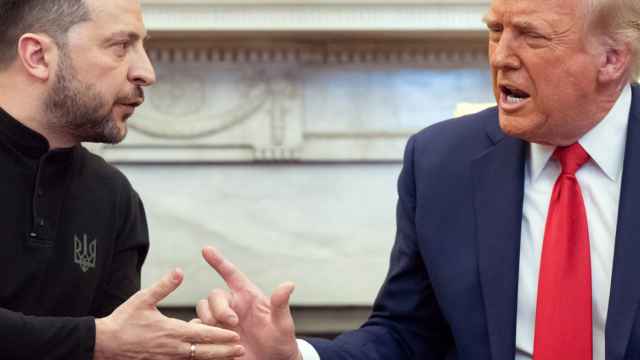Returning to Moscow from a business trip, I checked into the Intourist Hotel on the evening of Oct. 1, 1993. As usual, the curtains in my room overlooking Tverskaya Ulitsa would not draw closed, permitting the red light from a Panasonic neon sign opposite to illuminate my room throughout the night.
During the preceding week, the standoff between President Boris Yeltsin and the parliament had intensified. But I arrived in Moscow to the good news that both parties had agreed that the head of the Russian Orthodox Church would mediate the crisis. In an apparent gesture of concession, power had been restored to the parliamentary building, the White House, after days of darkness.
That evening, I ate the usual bland meal in one of the Intourist restaurants followed by a drink in the upstairs bar. A Russian who engaged me in conversation suggested that I might consider walking to Arbat and Novy Arbat on Saturday afternoon to watch celebrations marking the 500th anniversary of the historic area.
I awoke on Saturday, Oct. 2 to the gloomy news that talks presided over by Patriarch Alexy II had stalled, with both sides showing little interest in compromise. The newspapers also reported that for the fourth consecutive day, several thousand pro-parliament demonstrators clashed with riot police in the vicinity of metro station Barrikadnaya.
Given the geographic location of unrest, I decided against visiting Arbat celebrations and potentially walk into trouble. So I spent an uneventful Saturday in the vicinity of the hotel.
Oct. 3 seemed peaceful and quiet enough to walk a few blocks from my hotel to Rosie O'Grady's pub for Sunday lunch. I knew the bar and restaurant was on the same street as the Arbatskaya metro, yet some distance from the trouble — or so I thought. After a welcome meal of roast beef and vegetables washed down with a glass of draught Guinness stout, I visited the restroom. It was somewhat unsettling to find myself unexpectedly in a small room packed with soldiers armed with automatic weapons. I decided not to hang around Rosie O'Grady's even for another glass of Guinness and hurried back to my hotel.
From my hotel room later that afternoon, I watched a large helicopter fly slowly at window-level height on Tverskaya Ulitsa toward the Kremlin. I assumed President Yeltsin was returning to the Kremlin as unrest was beginning to spiral out of control.
Sunday evening television news showed demonstrators earlier in the afternoon gathered under the gaze of the monumental statue of Vladimir Lenin on Oktyabrskaya Ploshchad. An assembled crowd of about 15,000 people went on to fight a pitch battle with police in their collective endeavour to cross the Moscow River and march to the White House. In the early evening, a group of about 2,000 anti-Yeltsin protesters built a barricade of cars and buses close to the Ostankino television tower.
As evening fell, I walked out of the Intourist Hotel's main entrance to breathe fresh air, only to witness bottles upon bottles of vodka being passed by hotel staff to civilians manning the barricade in Tverskaya Ulitsa.
Returning to the hotel, I decided to try and get some sleep, but I was awakened by what appeared to be the sound of arms fire. I opened my room door to see several men running along the corridor, with one shouting back over his shoulder in accented English, "Don't worry, it will soon be over." I put on trousers and a sweater over my pajamas and went down into the hotel reception area where I saw a group of women sitting with suitcases.
One of the women explained they were tourists waiting to be evacuated from the hotel via the metro. Someone told me the nearby Rossiya Hotel had been raked by automatic-weapons fire. Imagining a firefight erupting any minute along Tverskaya Ulitsa, I went to the reception desk and requested a move to a quieter room on the opposite side of the hotel. I did not bother to transfer my belongings. I got into my new bed, only to lie back and see tracer fires passing parallel to my window. Sitting up in bed, I could see explosion upon explosion erupting from the vicinity of the White House. I also noted the silhouette of a fire escape outside of my window. I was too tired to think or be afraid and just fell asleep.
I awoke on Oct. 4 to a thundering noise followed by a sensation of the entire hotel building shaking, an unpleasant experience that was repeated several times after that. I quickly got dressed and went down to the reception to learn that T-72 tanks had fired rounds at point blank range into the White House. I also learn that overnight anti-Yeltsin forces had unsuccessfully attempted to storm the Ostankino television center with many victims.
The hotel receptionist who had given me a key to another room the previous night remained on duty, as was the doorman who guarded the hotel main entrance armed with nothing more than a nightstick. I spoke only a few words of Russian and in a foolish attempt to show my gratitude, I applauded the hotel staff and colleagues for their bravery in keeping us safe throughout a dangerous night.
I joined off-duty hotel staff and guests in one of the cafeterias, where all eyes were glued to a television, broadcasting CNN coverage of the besieged White House and the aftermath of fighting to control the Ostankino television tower.
Just before 10 a.m., ground troops loyal to Yeltsin stormed the White House under cover of tank and machine-gun fire, quickly bringing the lower floors of the building under their control. At midday, tanks fired rounds into the upper floors of the White House, and an hour later elite special forces made a final assault on the building. Yet it was not until past 6.00 p.m. that leaders of the uprising, former Vice President Alexander Rutskoi and Speaker of Parliament Ruslan Khasbulatov, surrendered. They left the White House and boarded a bus to take them to Lefortovo prison, not far from the Kremlin.
Except for a few isolated incidents, the fighting was over. The fighting in early October 1993 was heavier than had been seen in Moscow at any time since the 1917 Bolshevik Revolution.
I returned to my hotel room overlooking Tverskaya Ulitsa, and as darkness fell I witnessed a long, ghostly procession of buses with closed curtains. Trucks and cars slowly passed my window from the direction of the Kremlin, as though actors in the tragedy I had just witnessed were taking a final curtain call.
Michael Pudaloff, who worked in Australia and Britain for Soviet and Russian joint stock companies, is retired and lives in Britain.
A Message from The Moscow Times:
Dear readers,
We are facing unprecedented challenges. Russia's Prosecutor General's Office has designated The Moscow Times as an "undesirable" organization, criminalizing our work and putting our staff at risk of prosecution. This follows our earlier unjust labeling as a "foreign agent."
These actions are direct attempts to silence independent journalism in Russia. The authorities claim our work "discredits the decisions of the Russian leadership." We see things differently: we strive to provide accurate, unbiased reporting on Russia.
We, the journalists of The Moscow Times, refuse to be silenced. But to continue our work, we need your help.
Your support, no matter how small, makes a world of difference. If you can, please support us monthly starting from just $2. It's quick to set up, and every contribution makes a significant impact.
By supporting The Moscow Times, you're defending open, independent journalism in the face of repression. Thank you for standing with us.
Remind me later.






